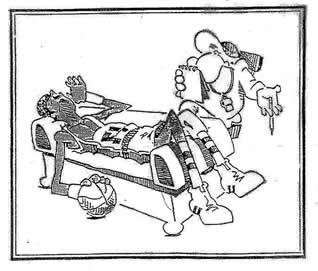Lebron James: The Mental Make-up
Written by @sportscheetah
One of the most intriguing arguments in sports right now, (whether it be on ESPN between paid analysts or between the every-day fan on Twitter), is discussing Lebron James and his inability to show-up and compete late in big games. Many people often ask: Why do great athletes sometimes fail to show up in important situations? More specifically, I’d like to ask why did Lebron James, so dominant in fourth quarters leading up to the NBA Finals last season, start making rookie mistakes when it mattered most?
Confronting this question from a sport psychologist’s point of view helps people understand that Lebron’s issues are real but that they can in fact be overcome. With the NBA Finals already under way and Miami facing a series deficit, I’m more curious to see how LBJ responds to his third crack at a title than I’ve ever been for another athlete.
Jumping back in time to the 1989 Stanley Cup Finals, we can learn a few things from one psychologist named Hap Davis. The story says that one of the Calgary Flames players came back to the dressing room right before the opening face-off in Game 1, turned to the team’s sport psychologist and made an honest confession: “I’m scared.”
Hap Davis has spent more than a generation examining why athletes succumb to pressure. He thinks he’s found an answer that explains both LeBron James’ poor play in the NBA Finals last year and why Dirk Nowitzki’s emotional response to winning paint a completely different picture.
To bore you guys a bit, here is your psychology lesson for the day: In moments of fear, the human body produces cortisol, which helps its fight-or-flight mechanism. When you hear the story about the boy who was able to lift a car off of his friend and save his life, that is cortisol at work. However, cortisol is not what a great athlete needs during a career defining moment. In fact, cortisol may get in the way of an essential ingredient for athletic performance, testosterone.
“That’s what comes with ability to stay in the moment — frontal cortex activation, motor cortex activation, and elevation in testosterone,” Davis says. Translation for the rest of us? Athletes who are able to stay focused keep producing this testosterone, which stimulates the part of the brain wired for motor skills such as shooting or dribbling… very basic skills for a professional basketball player.
“What we’ve seen in winners is huge testosterone-to-cortisol balance,” Davis says. “When they’re on their game, we see evidence that there may be an elevation of testosterone. When people are losing, they are overwhelmed with emotion. That’s cortisol.”
Davis found that when top athletes have a traumatic experience in a game or event and then return to a similar moment (such as the fourth-quarter of the NBA Finals), they often start producing cortisol. Davis worked for years with the Canadian Olympic team and he’s seen swimmers do perfectly well for years, in every competition, and then fall apart when they get to a scenario reminiscent of one where they struggled four or eight years earlier. It’s the exact same stroke or race, but it’s a completely different moment. The athlete responds not to the event but to the moment itself.
So, to sum this up, whenever athletes start thinking about the pride or pain of winning or losing, they can become overwhelmed with emotion and unable to perform the basic duties of playing in the present. “The moment someone thinks about the reward,” Davis says, “they are in a whole different space.” It is amazing from our standpoint to see the brilliance of what Dirk Nowitzki did in Game 6. He held his emotions back until the second the game ended and the title was won. Then, he ran off to the locker room to cry going from model of composure to being completely overcome with emotion. It was the literal opposite of what “chokers” often do. We’ve seen it in other scenarios across all sports including when one of the greatest of all-time Michael Jordan was so mentally gathered that he was able to win titles year in and year out by rising up during the biggest and most crucial moments.
Davis says the best way to erase the past is to dwell on it. Watch the failure again and again and again on tape until it evokes zero emotional response. Watch the disaster until you’re so numb to it that it feels like someone else is doing the failing.
So has Lebron James been able to overcome this constant pressure and failure from the 2011 NBA Finals? Many say that game 6 and game 7 of the Eastern Conference Finals against Boston showed he answered critics and is finally ready win a championship. Need I remind you that Lebron put on this exact same show last year, when he stepped up against the Celtics and Bulls on his way to the NBA Finals? We know what happened next. This is his first time back to the Finals and there is no question that last years’ experience will be on his mind. Only time will tell if Lebron has accepted his failure from last years’ NBA Finals or if he will shy away from the big moment yet again.
I personally have no reason to believe that an incredible performance in game 6 this past week automatically proves that he is ready mentally to take the leap. Sure, he is the best player and can dominate a game and put his team in a position where they don’t even need him to play in the final minutes. Although how can we dismiss game 5 at home in a crucial fourth-quarter that went down to the wire and Lebron did not even attempt a field-goal in the final 8 minutes till a last second meaningless dunk when the Celtics defense backed off? Who is to say that game 5 Lebron does not show up in these NBA Finals over the next few weeks? Because he had a historic performance in game 6 in which he was not even needed in the fourth-quarter, the very situation that has pestered Lebron in the past can’t be forgotten; I don’t buy it.
One day, I think Lebron will figure it out but we never saw these types of inconsistencies late in games during Jordan’s entire career. Until Lebron makes game 6 and game 7 against Boston the norm, it’s hard to consistently back this guy from a sports psychologist standpoint and the intestinal fortitude of a gambler.













